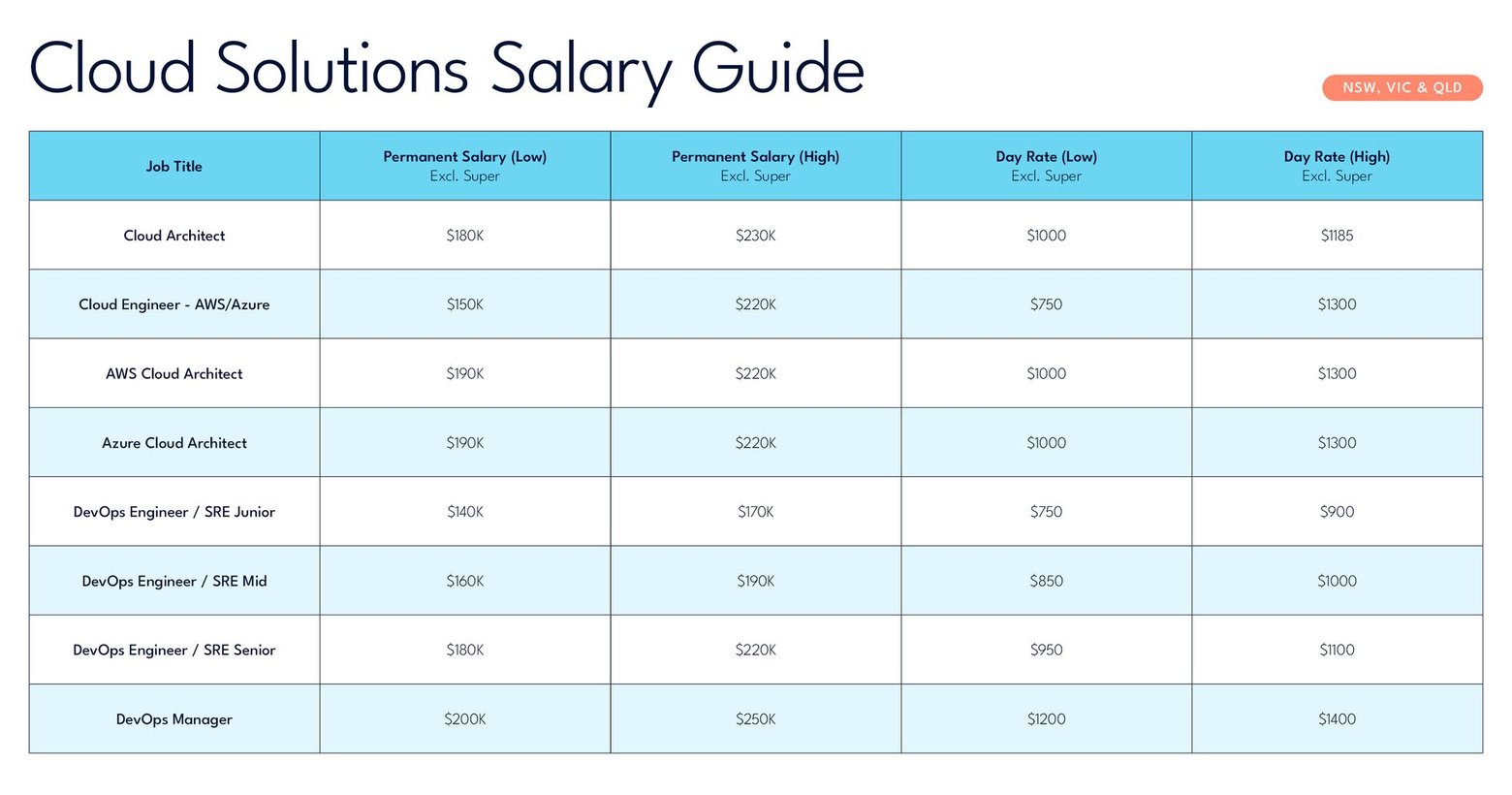Could your next career move be in DevOps?

Everything you need to know about DevOps careers – complete with 2024 salary benchmarks.
Contrary to what the job title suggests, ‘DevOps’ is so much more than a combo of “development” and “operations”.
DevOps is actually a cultural shift. A methodology that redefines how software development and operations work together – to produce high-quality software quickly and reliably.
As companies strive for agility and efficiency, the DevOps career path offers a dynamic and rewarding journey for tech enthusiasts.
We caught up with Martin Pearson – Principal Consultant at Talenza – to get his insights on forging a career path in DevOps.
Martin’s top market insights
We asked Martin to fill us in on the top trends and most in-demand industries for DevOp careers.
Martin says the demand for DevOps professionals is skyrocketing as more companies recognise the benefits of integrating development and operations teams.
Industries leading the demand for DevOps include:
- Finance
- Technology
- E-commerce
- Healthcare.
These are businesses where rapid and reliable software delivery is critical.
Martin’s key insights into the current market trends include:
1. Focus on Cloud services
Organisations are heavily investing in cloud infrastructure, with AWS and Azure leading the charge. Companies seek DevOps professionals skilled in managing cloud-based applications and services.
2. Shift Towards Automation and CI/CD
As businesses aim for faster release cycles, the demand for expertise in CI/CD pipelines and automation tools is growing. DevOps careers are increasingly about enabling continuous delivery of software.
3. Rise of Microservices Architecture
Many enterprises are transitioning from monolithic to microservices architecture. This necessitates skills in containerisation and orchestration with Docker and Kubernetes.
4. Security Integration
With the rise in cyber threats, integrating security practices into DevOps – often termed "DevSecOps" – is becoming a priority. Professionals who can embed security into the CI/CD process are in high demand.
Overall, Martin says the market shows a clear preference for DevOps professionals who can adapt to rapidly changing technologies and methodologies.
“The current market is emphasising agility, scalability, and reliability in software development,” says Martin.
What do DevOp careers pay? 💵💵💵
Ok, you’ve made it to the juicy bit. The dollar value for these careers.
From roles as a DevOps Engineer to landing a position as a DevOps Manager, here’s what you can expect to get paid.

Martin’s advice for DevOps job seekers
If you’re aspiring towards a DevOps career, here’s some valuable advice from Martin:
5. Embrace continuous learning
The DevOps landscape is constantly evolving, with new tools and practices emerging regularly. Stay curious and committed to learning.
6. Focus on collaboration
DevOps is as much about collaboration as it is about technology. Cultivate strong communication and teamwork skills to bridge the gap between development and operations.
7. Build a strong foundation
Understand the fundamentals of both software development and IT operations. Familiarise yourself with:
- Coding
- Scripting
- System administration.
8. Get hands-on experience
Practical experience is invaluable. Work on personal projects, contribute to open-source initiatives, or seek internships to gain real-world exposure.
9. Develop your problem-solving skills
DevOps often involves troubleshooting and optimising complex systems. Enhance your analytical and problem-solving abilities to tackle challenges effectively.
10. Seek mentorship
Connect with experienced DevOps professionals who can:
- Provide guidance
- Share insights
- Help you navigate your career path.
11. Start with small steps
Begin by mastering essential tools and concepts, then gradually expand your skills as you gain confidence and expertise.
12. Be adaptable
The ability to adapt to new technologies and methodologies is crucial. Embrace change and be open to experimenting with different approaches.
Follow these guidelines and stay proactive. Aspiring DevOps professionals can position themselves for success in a field that offers both exciting challenges and rewarding opportunities.
Technical skills worth developing
To succeed in DevOps, you’ll need a strong grasp of both – you guessed it – development and operations.
Technical skills play a pivotal role, especially proficiency in various specialisation tools and languages.
Understanding cloud platforms is essential for modern DevOps careers.
AWS (Amazon Web Services) remains the most dominant cloud provider, followed by Microsoft's Azure and Google Cloud Platform (GCP).
Key tools in DevOps include:
13. Infrastructure as Code (IaC)
Tools that enable developers to manage and provision infrastructure through code are essential for ensuring consistency and automation. These include:
- Terraform
- AWS CloudFormation
- Microsoft ARM Templates.
14. CI/CD Pipelines
Continuous Integration and Continuous Deployment (CI/CD) are core to DevOps. Tools that help automate code integration and deployment processes can reduce time-to-market. Skill up on tools like:
- GitHub Actions
- Azure DevOp
- Jenkins.
15. Containerisation and Orchestration
Docker and Kubernetes are essential for managing microservices and ensuring applications run consistently across environments. Kubernetes, while complex, offers robust solutions for orchestrating containers and managing scalable applications.
16. Automation tools
DevOps Engineers leverage tools like Ansible, Puppet, and Chef for configuration management – although these are becoming less common in modern setups.
Remember, it’s not all about technical skills. It’s important to note that a successful DevOp Engineer will harness the right combo of:
17. Effectively using the tools listed above
18. Developing strong problem skills
19. Excellent communication.
The goal is often to automate processes to the extent that manual intervention is minimal.
The philosophy here is that good DevOps Engineers automate themselves out of their job by making processes seamless and efficient.
Bringing it all together
Carving out a career in DevOps requires a blend of technical expertise, collaboration, and adaptability.
To make it in the field, Martin recommends you think about:
- Mastering the right tools
- Staying informed on market trends
- Pursuing relevant education
- Actively participating in industry events.
With a focus on continuous improvement and innovation, you’ll be well-equipped to drive the future of software development and operations.
Follow this advice and you’ll navigate the dynamic landscape of DevOps and make significant contributions to your organisation.
Keen to know more about advancing your career DevOps?
Download a copy of your 2024 Salary Guide here.
Or contact our team to chat about your next steps: